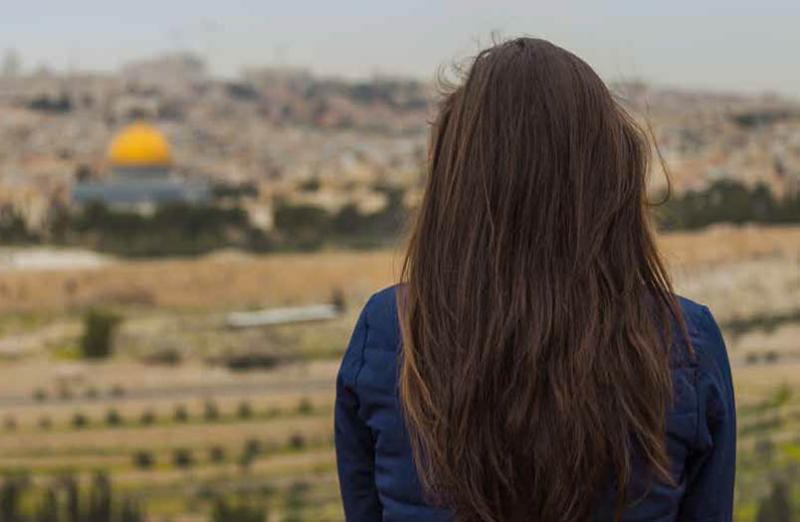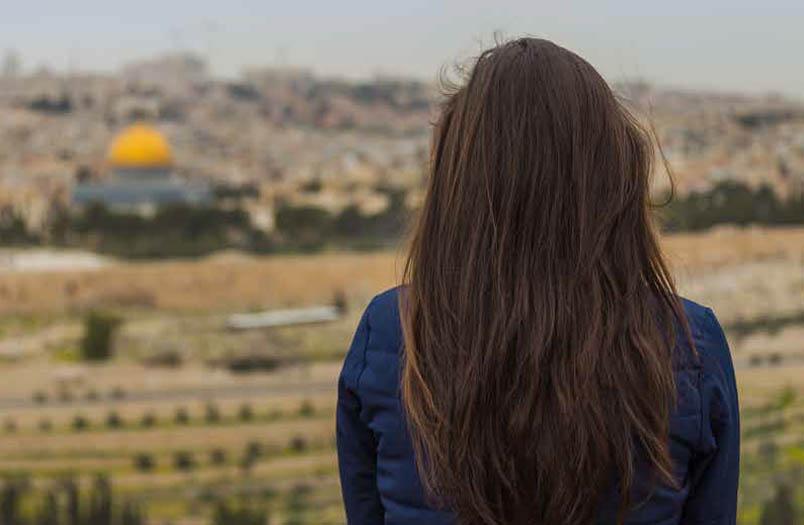
In my work as the President and CEO of Jewish Voice Ministries, I often get to teach and minister to people who have not yet had the privilege of traveling to the Holy Land. I love talking about Israel. It’s a beautiful place and holds so much meaning for the people of God. Every time I go, I feel the presence of the Lord even more deeply.
One thing I’ve noticed over the years is that no matter who I’m talking to, people are always surprised by just how geographically small the country is. Israel is the epicenter of God’s redemption story, and yet the country is really not much bigger than the tiny state of New Jersey.
I’m reminded of a parable that Yeshua (Jesus) shared with His followers about the mustard seed. It’s a tiny seed that grows into a huge, sturdy plant. It can be the same with our faith. Jesus said, “Amen, I tell you, if you have faith the size of a mustard seed, you will say to this mountain, ‘Move from here to there,’ and it will move” (Matthew 17:20). Israel is like that mustard seed: it seems insignificant to the undiscerning eye. But in fact, I believe it is the most important sliver of land in the history of the world.
One of the most rewarding parts of our ministry at Jewish Voice is that we get to serve the people of Israel, who need both physical protection from their enemies and the spiritual opportunity to hear the Good News that Jesus is their Messiah. But I believe that in order to effectively minister in Israel, we first have to understand what’s going on on the ground there. So I want to share with you some of the challenges Israel faces today – not to scare you, but to impress upon you just how important it is that we pray for and support God’s people there.
ISRAEL TODAY
To live in Israel today is to live in a constant state of vigilance. Since it became a nation in 1948, leaders of several nearby nations have disputed not just Israel’s borders, but the country’s very right to exist. The conflict between Israel and Palestinian authorities in particular has led all too often to terrible bloodshed and tragedy. In fact, since 2001, more than 28,000 rockets have been fired into Israel from Palestinian territory. That works out to roughly four rockets every day for eighteen years. Terrorists often aim the rockets at military targets, but they also point them elsewhere: schools, hospitals and neighborhoods. Think about it like this: students inside American schools have fire drills. In Israel, students learn how to take shelter during a missile strike.
It’s not just missiles, either. Palestinian terrorists from groups like the Palestinian Liberation Organization and the fundamentalist Islamic group Hamas have attacked Israelis with car bombs, guns and knives. Sometimes, terrorists ram cars into crowds. Time and time again, perpetrators testify afterwards that their aim was simple: they wanted to kill Jews.
Not every Palestinian feels this way, and certainly not every Palestinian is a terrorist. But the strife has hardened an entire generation of politically-minded and often influential Palestinians against Israel. Even the Palestinian Authority – the internationally recognized government over the Palestinian territories – admitted last year that they pay financial rewards to the families of terrorists who target Israelis.
These threats would be challenge enough for any nation, let alone one as small as Israel. But in fact it’s not just Palestinian terrorists who oppose Israel’s right to exist. Many other Middle Eastern nations harbor a supernatural hatred for the people of Israel, including dangerous regimes like those in Syria and Iran.
Modern Iranian leaders have been outspoken in their desire to see Israel destroyed. Still, Israel has remained patient and hesitant to respond with violence to Iran’s provocations. But tensions are rising even today as Iran seeks to expand its nuclear program.
Israeli Prime Minister Benjamin Netanyahu had nothing but praise for President Donald Trump after he pulled out of the U.S.–Iranian Nuclear Deal last year. (Trump and many other U.S. leaders were concerned that despite U.S. sanctions, Iranian leaders couldn’t be trusted to keep its uranium enrichment under agreed-upon levels.) But that doesn’t mean Iran has stopped working toward building its own nuclear bomb. Netanyahu and the entire Israeli government must be vigilant against this terrifying effort. If a regime bent on violent anti-Semitism one day builds a weapon that could destroy Israel in one fell swoop, a human catastrophe could be right around the corner.
All of Israel’s citizens are under threat – and that includes a small but important subset of the population from Ethiopia. Today there are roughly 140,000 Ethiopian Jewish people – members of the Beta Israel community – who have emigrated to Israel since the 1980s. In 2015, the Israeli government promised to bring the remaining 10,000 Ethiopian Jews to Israel by 2020. These Jewish brothers and sisters are coming to Israel to escape anti-Semitism, violence and abject poverty; but uprooting and moving to a new country is still tremendously difficult. Israel welcomes these immigrants, but the Ethiopian Jews often face a language barrier and other difficulties that accompany adjusting to life in an entirely new place.
The plight of the Ethiopian Jewish people is painful to witness. The Palestinian and Iranian threats are terrifying. And the instability and anti-Semitism found in many other of Israel’s neighbors – think Lebanon, Syria and others – make a lethal combination. But perhaps the most heart-breaking threat facing Israel today is not the threat of violence, but the hatred that comes from the rest of the world; even nations in the west.
There are 193 countries that belong to the United Nations. The UN is supposed to be an organization that seeks peace beyond borders, ethnicities or religions. Unfortunately, that has not been the case. Even in our age of evil North Korean dictatorships and extreme Islamic terror in countries like Iran, Nigeria and Syria, the UN has actually passed more resolutions condemning Israel than every other country in the world combined. It’s so absurd that it can only lead me to one conclusion: this is supernatural. This is intense spiritual warfare against Israel.
WHY SHOULD WE CARE?
Given the huge odds stacked against Israel, it might be tempting to throw up our hands in despair. But my friends, to do that would be to miss God’s heart.
First and foremost, the people of Israel are fellow image-bearers of the God of Israel. They deserve our respect, care and support for that reason alone. But the Bible paints an even bigger picture. The story of the nation of Israel and the story of God’s people across the world are supernaturally intertwined. Not only is the Land of Israel the physical place God promised to give to Abraham’s descendants; not only is it where Jesus lived and sacrificed His life here on earth; but it’s also center stage for the next chapter in God’s redemption story.
The Bible is clear: when Jesus returns, He is not coming back to New York. He’s not coming to London or Paris or Dubai. And He’s not coming back to some metaphorical “Jerusalem in the sky” – He is coming back to Jerusalem. The same beautiful, ancient city that weathers so many religious and cultural conflicts today will be the site of the final redemption of all those who call upon the name of Jesus! Just look at this incredible End Times prophecy we find in the book of Zechariah:
On that day His feet will stand on the Mount of Olives, east of Jerusalem . . . Then the Lord my God will come, and all the holy ones with Him.
—Zechariah 14:4, 5 (NIV)
And it gets even better. Not only does the Bible teach that Jerusalem, God’s “holy hill,” will be the site of Jesus’ return, but it will also be from His throne in Jerusalem that Yeshua will establish His Kingdom over all the earth.
It is my sincere hope that this vision of Jerusalem – as the city where Jesus will return and reign over a world with no more pain – captures your heart as it has mine. Because when we know just how special the Land of Israel is to our own story – even if we live halfway around the world – then we can begin to understand why it’s so important that we stay up-to-date on what’s happening there and how we can be a part of caring for both the Land and the people.
WHAT CAN WE DO?
“Pray for the peace of Jerusalem,” Psalm 122 says. “They shall prosper that love thee” (KJV). I close every episode of our television show with this beautiful promise from the Old Testament. I do that for a reason. I truly believe that praying, with fervor and faith, for the people of Israel is one of the most important ways we can love and minister to our brothers and sisters who live there.
But there are other ways, too. I’m so excited to share the rest of this magazine issue with you, where you’ll be introduced to some of the truly thoughtful, creative and effective ministries that are working on the ground in Israel. These folks are blessing Holocaust survivors. They are blessing impoverished Ethiopian immigrants. They are sharing the Gospel with spiritually starving Jewish people. We are so blessed to work with fantastic partner ministries, and it is my sincere hope that you’ll be as inspired by their work as I am.





